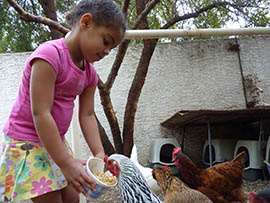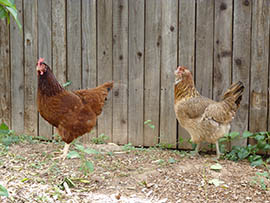- Slug: BC-CNS-Chicken Bill,830
- Sidebar: About the bill.
- Photos available (thumbnails, captions below)
- YouTube video
By HARMONY HUSKINSON
Cronkite News Service
CHANDLER – In Denise Phillips’ 1-acre backyard, 11 chickens are tucked away in a corner coop, and 4-year-old Phoebe Brethower is beyond excited to play with them.
Phillips, who is Brethower’s godmother, hands the girl a bowl full of chicken seed. The hungry fowl flock to Brethower and pick out choice seeds.
“They’re going to peck me!” she exclaims with a smile.
“No, they’re not,” Phillips says, watching over from the corner of the coop. “Just stay still.”
Phillips is allowed to keep chickens and benefit from a steady supply of fresh eggs because her home is zoned as horse property, but that isn’t the case for most other homeowners in this Phoenix suburb. Since 1959, a city ordinance has prohibited chickens and any other animals not considered household pets in residential areas.
“I think Chandler was very silly,” Phillips said. “Every city in the area, in the greater Phoenix area, allows chickens,” she said.
A bill sponsored by Sen. David Farnworth, R-Mesa, would provide every homeowner with the chance to own a chicken and other fowl like peacocks or ducks. SB 1151 would bar cities from banning backyard fowl.
“Someone who has limited funds might be tempted to use food stamps. But there are many people who feel like they’d like to raise their own food rather than become dependent on government,” Farnsworth said.
After moving through the Senate with little opposition, the legislation sparked a heated debate March 18 in the House Government Committee, which endorsed it on a 5-3 vote.
Dubbed The Homegrown Freedom Act and often called “the chicken bill,” SB 1151 has incited everything from discussion about the uncleanliness of fowl to debate on American freedom and property rights.
“This is about a lot more than chickens,” said Rep. Warren Petersen, R-Gilbert, who voted for the bill in the House Government Committee.
The conflict centers on a person’s right to own chickens versus a neighbor’s right to not deal with chicken noises, smells or feathers.
“Right now in Chandler they can’t even control weeds in the alley. How are they going to control the chickens?” said Dane Kudding, a Chandler resident who spoke against the bill.
Farnsworth said he decided to back the bill because he doesn’t believe in a city taking away a citizen’s liberty versus maintaining what he called a neighbor’s lifestyle.
“When we use government to protect ourselves from our neighbors, we buy that with part of our liberty,” Farnworth said.
Farnsworth grew up in “right in the middle of Mesa,” and said as a kid he had chickens, rabbits, a garden and even goats for a while in a backyard that was a little smaller than an acre.
“As a young person I felt like I was close to nature and really understood where things came from rather than just going down to the grocery store,” he said.
Ken Strobeck, executive director of the Arizona League of Cities and Towns, said the decision should be made by local officials rather than the state.
“It is a preemption of what should be a city decision. Many cities do not have restrictions on backyard fowl, particularly chickens,” Strobeck said. “People who are in certain neighborhoods have an expectation that they are going to be in an area that is not like a barnyard.”
Galen Luth, who owns a small family farm in Mesa, introduced the issue of cities banning fowl ownership to Farnsworth and said he thought it was ridiculous that some cities allowed chickens and other didn’t.
“It’s almost like a black market out there,” Luth said. “A lot of people, they want to be legal, they want to be able to come out and show what they have. Believe me, there is thousands and thousands that have their little chickens in their backyard and they hide them.”
Greg Peterson is owner and director of the Urban Farm in Phoenix, a city where a half-acre backyard can have up to 20 chickens. He spends his time giving tours of and teaching classes about sustainable living.
By growing food in the backyard and having chickens for eggs, a person can save money and be healthy, he said.
“Chickens help contribute to the overall health of the yard. In nature, things kind of go circular. You get the whole cycle of life and chickens help with that cycle of life,” he said.
In Phillips’ backyard in Chandler, she lets the chickens out of the coop to wander free on her lawn and under the olive trees, knowing they’ll return within the hour to roost.
“Backyard chickens to some people are a new thing,” Phillips said. “Unless that person was raised in the country or they’re out in the country, they typically have not been around chickens. So I think it’s just the fear of the unknown.”
^___=
SB 1151 provisions:
• Would prohibit municipalities from banning fowl in the backyards of a single-family homes.
• Fowl are defined as birds raised for the purpose of consumption.
• Cities would be able to restrict the number of birds and the ownership of male fowl like roosters.
• Would preempt local ordinances.
^___=

Four-year-old Phoebe Brethower feeds a chicken in the Chandler backyard of her godmother, Denise Phillips. While the zoning for Phillips’ property allows chickens, a city ordinance forbids them in the yards of most other homes. (Cronkite News Service Photo by Harmony Huskinson)

While the zoning for Denise Phillips’ Chandler property allows chickens, a city ordinance forbids them in the yards of most other homes. She’s shown here with her goddaughter, Phoebe Brethrower. (Cronkite News Service Photo by Harmony Huskinson)

Chickens roam Chickens roam at the Urban Farm in Phoenix. (Cronkite News Service Photo by Harmony Huskinson)